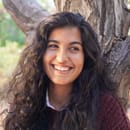I have always existed in two languages: English and Spanish. There has never been a time when I have been without either. Having been born to Chilean parents in California — and then moving to Boulder, Colorado, while my dad pursued a doctoral degree — I learned both languages at the same time. But for the majority of my life, I’ve kept these languages separate.
For my first four years, the outside world was in English, while my home life was in Spanish. Then, after my dad graduated, we moved back to Santiago, Chile, and the outside world became fast-paced Chilean Spanish, while English became the language of music, TV, and doll games with my sisters. However, my parents didn’t want us to lose our English skills, so they enrolled us in a bilingual school, where, up until I was in fourth grade, every classroom lesson was in English, and Spanish was for recess and playground gossip.
Then, when I was 16, my family and I moved from Santiago back to Boulder. I thought I was set for success: I was fluent in English, I’d had straight As practically my whole life, and I even emailed my new school’s softball coach to join the JV team — despite never having played before — so I had an extracurricular lined up. Safe to say, I was confident. However, I soon learned that there is only so much you can prepare for, only so much merely speaking a language can do for you, when integrating into a new culture.

I knew from the beginning that I was going to struggle talking with peers and learning their slang, given that, up until this point, my English education was pretty much limited to the classroom. What I did not know, however, was that I was going to have to prove to teachers and classmates how smart I was. People were so focused on the way I sounded that they didn’t pay attention to what I was saying. They focused on my grammar mistakes and missed the points I was making. I’ll never forget the time a classmate asked me what I was doing in AP U.S. History *while* I was tutoring her in chemistry. I wish I had said something witty or called her out on how offensive and insulting that was, but at the time, I was too shocked to have a response like that. Instead, I simply told her I was used to advanced classes — and then the bell rang and that was that. That one comment, which came from a mix of ignorance and genuine curiosity rather than malice, has stuck with me to this day.
Despite my high school experiences, I decided to stay in Boulder for college, enrolling at the University of Colorado Boulder — and thankfully, I was immediately appreciative of the diversity I found there. While CU Boulder is still a PWI (predominantly white institution), my classrooms had people who looked like me, and people who didn’t. The medley of perspectives and experiences has truly influenced my own, allowing me to embrace multiple facets of my identity — including both my languages.
Going into college, I’d wondered if I’d ever write in Spanish, since English was the only language I’d ever used in my academic writing. For a while, I was right — writing workshops were in English, and if I chose to write in Spanish, I wouldn’t be able to get feedback on them. However, last year, when I decided to write a short novel — a sort of autobiographical piece, where, like me, my main character moves from Chile to Colorado — for my honors thesis, I had the idea of mingling Spanish into the prose. It felt like a disservice to my main character to write this story all in English, because if I don’t just exist in English, why should she? If my thoughts jump from one language to another, why wouldn’t hers? So, I asked if I could, and my advisor was all for it!

When I came to the realization that I could and should combine languages in my writing, I started allowing myself to combine them in my day to day as well — and it’s been a game-changer. For the past six years that I have lived in Colorado, there’s been a clear distinction in where I use each language: Spanish is my home language; it always has been. It’s what I use to speak to my family, how I first feel my emotions — my joy, sadness, and anger — and how I begin and end my day. English is for everything else: talking to my friends and boyfriend, interacting with strangers and classmates, and writing in my planner and to-do lists.
For the last year or so, however, I’ve let Spanish leave the confines of my home. I’ll use phrases and idioms I grew up with in regular conversations, which, to my surprise, has deepened my connections with the people around me. My Netflix watchlist is a mix of La Casa de Papel and Brooklynn 99; my music library plays Chappell Roan and Cami, Bon Jovi and Soda Stereo; and I’ll reference Don Quixote and Pablo Neruda and Laura Esquivel in my literature classes as a way to bring in my own culture and experiences — even if I have to translate them. Letting go of the language limitations I once had has been a great experience — because I have always existed in two languages, and letting these languages meld together is a beautiful thing.


